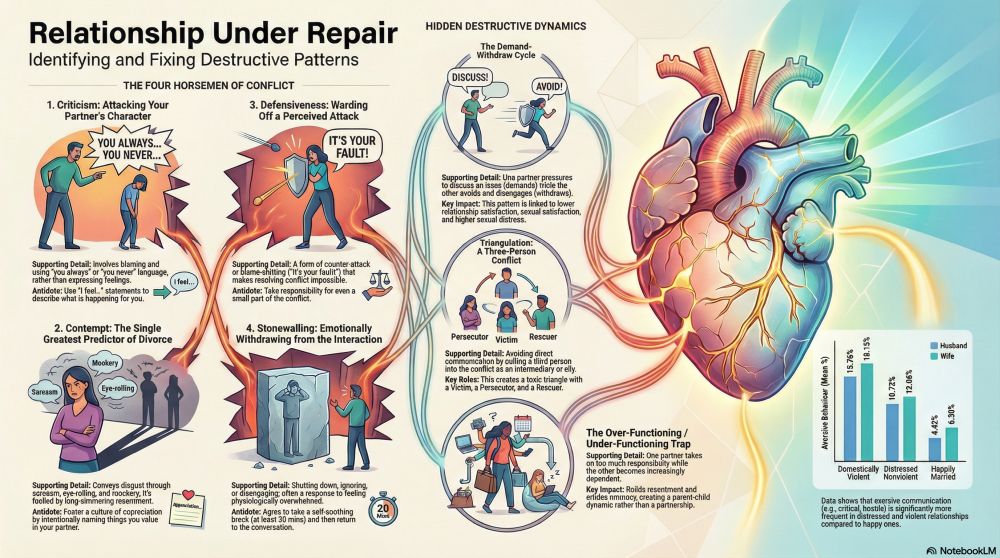Effective Communication Techniques: Measured Impact
Evidence-based communication skills that strengthen relationships and reduce conflict
Communication Techniques & Their Proven Effectiveness
Research-backed outcomes from consistent practice of key communication skills
💡 Key Finding: Soft start-ups predict 80% higher problem-resolution rates, while validation reduces negative affect by 65%. Active listening shows strong correlation (r = 0.42) with empathy and lower defensiveness.
5 Core Communication Skills
Active Listening
Give full attention, avoid distractions, use reflective feedback. Boosts empathy and lowers defensiveness (r = 0.42)
Clarity & Honesty
Express thoughts, feelings, and concerns clearly to prevent misunderstandings and build trust
Empathy & Validation
Understand and validate emotions. Reduces negative affect by 65% when applied before advice-giving
Emotional Regulation
Manage emotions during conflict through breathing, humour, or time-outs to prevent escalation
Adaptation & Feedback
Adjust communication styles to fit both partners' needs. Constructive feedback supports mutual growth
Quick Communication Tips
Use "I" Statements: "I feel unheard when..." instead of "You never listen"
Schedule Check-Ins: Weekly rituals surface small issues before they escalate
Clarify Intent: "I want us to understand each other better" lowers defensiveness
Listen to Understand: Pause, summarize, confirm: "So you're saying..."
Repair Quickly: "That came out wrong" or "Can I try again?" resets tone
Balance Positivity: Maintain 5 positive interactions for every 1 negative
Hover over bars for detailed insights about each communication technique
Good communication is essential for building and maintaining healthy, satisfying relationships. Key elements include clarity, active listening, empathy, openness, and adapting communication styles to fit both partners’ needs and cultural backgrounds.
Core Communication Skills
- Clarity and Honesty: Clearly expressing thoughts, feelings, and concerns helps prevent misunderstandings and builds trust between partners.
- Active Listening: Giving full attention, avoiding distractions, and showing understanding through reflective feedback fosters emotional closeness and reduces conflict.
- Empathy: Understanding and validating each other’s emotions strengthens connection and aids in resolving disagreements.
- Feedback: Constructive feedback and open dialogue support mutual growth and relationship satisfaction.
Emotional and Nonverbal Communication
- Emotional Expression: Sharing both positive and negative feelings maintains authenticity, but negative emotions must be managed to avoid escalation.
- Nonverbal Cues: Affection is often communicated through behaviour—physical touch, eye contact, tone, or shared activities—aligned with each partner’s “love language.”
- Emotion Management: Regulating emotions during conflict through breathing, humour, or time-outs prevents physiological flooding and promotes constructive dialogue.
Cultural and Individual Differences
- Communication Styles: Directness, expressiveness, and conflict-avoidance differ across cultures. Satisfaction rises when partners respect and adapt to these stylistic preferences.
- Adaptation Over Time: Long-term couples tend to develop shared shorthand and smoother conflict navigation as empathy and joint problem-solving deepen.
Practical Strategies
- Use “I” Statements: Replace blame with ownership (e.g. “I feel unheard when interruptions happen” instead of “You never listen”).
- Schedule Check-Ins: Weekly or fortnightly communication rituals help surface minor issues before they grow.
- Clarify Intent: Start difficult conversations by stating goals—“I want us to understand each other better”—to lower defensiveness.
- Listen to Understand, Not to Respond: Pause before replying, summarise your partner’s words, and confirm accuracy (“So you’re saying…”).
- Repair Quickly: Use small statements such as “That came out wrong” or “Can I try again?” to reset tone during heated exchanges.
- Balance Positive to Negative Ratio: Maintain at least five positive interactions (kind words, affection, humour) for every negative one—a ratio linked to stable, satisfying relationships.
Summary Table: Effective Communication Techniques
| Technique | Example Phrase | Research Outcome | When to Apply |
|---|---|---|---|
| Active Listening | “It sounds like you felt left out when that happened.” | Boosts empathy and lowers defensiveness (r = 0.42) | During emotional disclosures |
| Soft Start-Up | “I’d like to talk about something that’s been on my mind.” | Predicts 80% higher problem-resolution rate | At conflict onset |
| Validation | “That reaction makes sense given the situation.” | Reduces negative affect by 65% | Before offering advice or feedback |
| Clarification | “Can I check that I understood what you meant?” | Improves message accuracy and trust | Whenever miscommunication arises |
| Gratitude Expression | “Thanks for explaining that so clearly—I appreciate it.” | Increases relationship satisfaction 0.21 effect size | After discussions or resolutions |
In summary, effective communication relies on clear expression, active empathy, and timely repair attempts. When couples consistently practise these skills, they strengthen emotional safety, reduce conflict cycles, and deepen intimacy over time.


